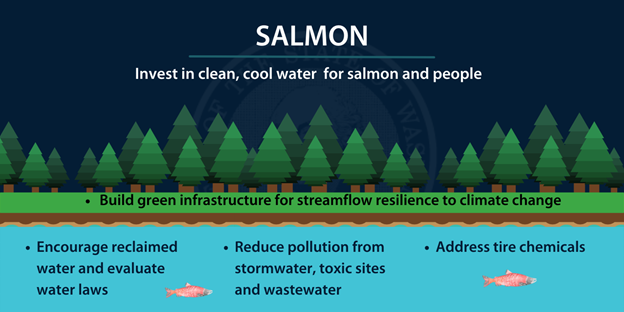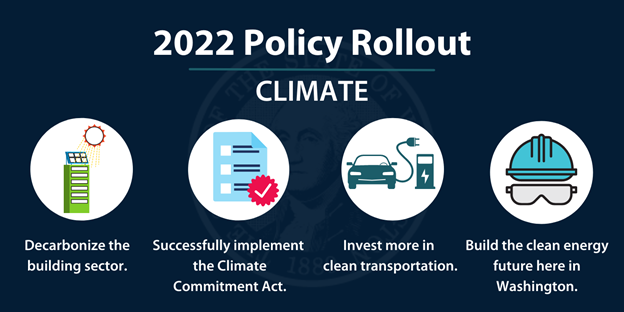Source: Governor Jay Inslee’s Medium, December 16, 2021
Washington Governor Jay Inslee released his new, recommended supplemental operating, capital, and transportation budgets on Thursday, December 16th. Gov. Inslee’s budget proposal of $61.8 billion outlines his priorities and includes new spending on pandemic response, homelessness, climate change, salmon protections, transportation projects, state employee raises, and other items.
The Governor’s budget is the first step of the supplemental budget process. Inslee outlines his priorities, and the Legislature follows with budget proposals in January and February. The Legislature will then send their proposals to the Governor on or before their final day, March 10, 2022, assuming no special sessions.
The Governor’s supplemental budget proposal comes at a time of positive revenues for the state. The Economic and Revenue Forecast Council projected revenue collections for the 2021-2023 biennium were $898 million above the September forecast. Projections for the 2023-2025 biennium increased by more than $965 million. The Governor’s supplemental operating budget proposal uses the new revenue to increase spending to about $62B for the biennium (two years), up from the $59B budget adopted by the legislature and signed by the Governor last spring.
Of interest to the cleantech sector, the Governor’s supplemental transportation budget spends $1B more than the previous year’s budget, a somewhat significant increase fueled by passage of the federal Infrastructure Investment & Jobs Act and a one-time transfer from the state’s operating budget. Under the Governor’s supplemental budget plan, the ferry system receives significant investments to construct the first hybrid-electric ferry vessel. Other key cleantech related items include:
- Decarbonizing new construction, including calling for the discontinuation of natural gas in new buildings
- Requiring Department of Ecology to advance legislation outlining how emissions-intensive, trade-exposed industries (EITEs) reduce emissions
- Implementation of the newly adopted Climate Commitment Act
- Amending the Energy Facility Site Evaluation Council, and
- Funds over $140 million to reduce greenhouse gas emissions in the transportation arena dedicates at least 50% of funding to transportation improvements aimed at overburdened communities.
The Governor’s proposed budget also puts $600 million back into the “Rainy Day” fund, in addition to the $574 million required for the current two-year budget. The Governor predicts that the state’s reserves will return to pre-pandemic levels over the next four years.
For additional details, the Governor’s Office offers a highlights document, plus the breakdown of the budgets here: https://ofm.wa.gov/budget/state-budgets/gov-inslees-proposed-2022-supplemental-budgets/highlights-gov-inslees-proposed-2022-budget
We urge CleanTech Alliance members to register now for the CleanTech Alliance’s annual Advocacy Day, held virtually on January 31, 2022. We will hear from both Lisa Brown, Director of the state Department of Commerce, and Becky Kelley, Senior Policy Advisor for Climate to Gov. Jay Inslee. The Alliance’s Advocacy Day provides an excellent forum to learn more about budget priorities, policy initiatives, and legislative action that will impact members of the CleanTech Alliance and the state of Washington.
Please contact Lindsay McCormick for additional information or to answer questions: lindsay@cleantechalliance.org
For a more detailed, line-item list of the Governor’s 2022 supplemental budget proposal, see below:
- $364 million for the state’s ferries
- $800 million to combat homelessness
- $1 billion in K-12 schools
- $26.5 million for foster youth
- $12 billion for transportation
- $626.5 million to fund climate change initiatives
- $100 million a year rebate program for electric vehicle purchases
- $100 million a year for solar energy grants to utilities, tribes, local governments, and school districts
The Governor requests $626.5 million to fund climate change initiatives and $12 billion for transportation:
- Decarbonize the building sector.
- Successfully implement the Climate Commitment Act.
- Invest more in clean transportation.
- Build the clean energy future here in Washington and transitions workers for the green economy.
- Make other climate investments (such as reducing food waste, creating sustainable farms and fields).
- Invest in Washington’s vital ferry system.
- Advance ultra-high-speed ground transportation.
- Increase diversity, equity, and inclusion in transportation.
- Support clean transportation (includes climate agenda items) and keep other significant projects moving forward.
The Governor’s budget requests also include a comprehensive suite of policy changes and investments totaling nearly $187 million to help restore salmon populations across the state and meet tribal fishery obligations.
- Protect and restore vital salmon habitat.
- Invest in clean water infrastructure for salmon and people.
- Correct fish passage barriers and restore salmon access to historical habitat.
- Build climate resiliency.
- Align harvest, hatcheries, and hydropower with salmon recovery.
- Address predation and food web issues for salmon.
- Enhance commitments and coordination across agencies and programs.
- Strengthen science, monitoring, and accountability.
Washington Governor Jay Inslee released his new, recommended supplemental operating, capital, and transportation budgets on Thursday, December 16th. Gov. Inslee’s budget proposal of $61.8 billion outlines his priorities and includes new spending on pandemic response, homelessness, climate change, salmon protections, transportation projects, state employee raises, and other items.
The Governor’s budget is the first step of the supplemental budget process. Inslee outlines his priorities, and the Legislature follows with budget proposals in January and February. The Legislature will then send their proposals to the Governor on or before their final day, March 10, 2022, assuming no special sessions.
The Governor’s supplemental budget proposal comes at a time of positive revenues for the state. The Economic and Revenue Forecast Council projected revenue collections for the 2021-2023 biennium were $898 million above the September forecast. Projections for the 2023-2025 biennium increased by more than $965 million. The Governor’s supplemental operating budget proposal uses the new revenue to increase spending to about $62B for the biennium (two years), up from the $59B budget adopted by the legislature and signed by the Governor last spring.
Of interest to the cleantech sector, the Governor’s supplemental transportation budget spends $1B more than the previous year’s budget, a somewhat significant increase fueled by passage of the federal Infrastructure Investment & Jobs Act and a one-time transfer from the state’s operating budget. Under the Governor’s supplemental budget plan, the ferry system receives significant investments to construct the first hybrid-electric ferry vessel. Other key cleantech related items include:
- Decarbonizing new construction, including calling for the discontinuation of natural gas in new buildings
- Requiring Department of Ecology to advance legislation outlining how emissions-intensive, trade-exposed industries (EITEs) reduce emissions
- Implementation of the newly adopted Climate Commitment Act
- Amending the Energy Facility Site Evaluation Council, and
- Funds over $140 million to reduce greenhouse gas emissions in the transportation arena dedicates at least 50% of funding to transportation improvements aimed at overburdened communities.
The Governor’s proposed budget also puts $600 million back into the “Rainy Day” fund, in addition to the $574 million required for the current two-year budget. The Governor predicts that the state’s reserves will return to pre-pandemic levels over the next four years.
For additional details, the Governor’s Office offers a highlights document, plus the breakdown of the budgets here: https://ofm.wa.gov/budget/state-budgets/gov-inslees-proposed-2022-supplemental-budgets/highlights-gov-inslees-proposed-2022-budget
We urge CleanTech Alliance members to register now for the CleanTech Alliance’s annual Advocacy Day, held virtually on January 31, 2022. We will hear from both Lisa Brown, Director of the state Department of Commerce, and Becky Kelley, Senior Policy Advisor for Climate to Gov. Jay Inslee. The Alliance’s Advocacy Day provides an excellent forum to learn more about budget priorities, policy initiatives, and legislative action that will impact members of the CleanTech Alliance and the state of Washington.
Please contact Lindsay McCormick for additional information or to answer questions: lindsay@cleantechalliance.org
For a more detailed, line-item list of the Governor’s 2022 supplemental budget proposal, see below:
- $364 million for the state’s ferries
- $800 million to combat homelessness
- $1 billion in K-12 schools
- $26.5 million for foster youth
- $12 billion for transportation
- $626.5 million to fund climate change initiatives
- $100 million a year rebate program for electric vehicle purchases
- $100 million a year for solar energy grants to utilities, tribes, local governments, and school districts
The Governor requests $626.5 million to fund climate change initiatives and $12 billion for transportation:
- Decarbonize the building sector.
- Successfully implement the Climate Commitment Act.
- Invest more in clean transportation.
- Build the clean energy future here in Washington and transitions workers for the green economy.
- Make other climate investments (such as reducing food waste, creating sustainable farms and fields).
- Invest in Washington’s vital ferry system.
- Advance ultra-high-speed ground transportation.
- Increase diversity, equity, and inclusion in transportation.
- Support clean transportation (includes climate agenda items) and keep other significant projects moving forward.
The Governor’s budget requests also include a comprehensive suite of policy changes and investments totaling nearly $187 million to help restore salmon populations across the state and meet tribal fishery obligations.
- Protect and restore vital salmon habitat.
- Invest in clean water infrastructure for salmon and people.
- Correct fish passage barriers and restore salmon access to historical habitat.
- Build climate resiliency.
- Align harvest, hatcheries, and hydropower with salmon recovery.
- Address predation and food web issues for salmon.
- Enhance commitments and coordination across agencies and programs.
- Strengthen science, monitoring, and accountability.

